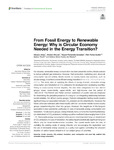Mostrar o rexistro simple do ítem
From Fossil Energy to Renewable Energy: Why is Circular Economy Needed in the Energy Transition?
| dc.contributor.author | Ishaq, Maryam | |
| dc.contributor.author | Ghouse, Ghulam | |
| dc.contributor.author | Fernández-González, Raquel | |
| dc.contributor.author | Puime Guillén, Félix | |
| dc.contributor.author | Tandir, Natasa | |
| dc.contributor.author | Santos de Oliveira, Helena María | |
| dc.date.accessioned | 2022-10-04T11:42:20Z | |
| dc.date.available | 2022-10-04T11:42:20Z | |
| dc.date.issued | 2022 | |
| dc.identifier.citation | Ishaq M, Ghouse G, Fernández-González R, Puime-Guillén F, Tandir N and Santos de Oliveira HM (2022) From Fossil Energy to Renewable Energy: Why is Circular Economy Needed in the Energy Transition? Front. Environ. Sci. 10:941791. doi: 10.3389/fenvs.2022.941791 | es_ES |
| dc.identifier.issn | 2296-665X | |
| dc.identifier.uri | http://hdl.handle.net/2183/31766 | |
| dc.description.abstract | [Abstract]: For decades, renewable energy consumption has been presented as the ultimate solution to reduce pollutant gas emissions. However, their production, marketing, and, above all, consumption are not entirely climate neutral, so society needs new practices, such as circular energy, to achieve a more efficient energy transition (Khan et al., 2021a; Khan et al., 2021d). This study aims at exploring the effects of energy intensity, renewable energy consumption and forestation on CO2 emissions for developed and developing countries. Owing to cross-country income disparity, the data were categorized into four distinct groups: lower, lower-middle, upper-middle, and high-income over the period of 1980–2018. The Pedroni and Fisher-Johnson estimators of pooled data are employed for determining the plausible presence of a long-run co-integrating relationship between model variables. For all four country groups, Pedroni cointegration testing results reveal a significant long-run association between CO2 emission and its determinants. However, the Fisher-Johansen estimator yield mixed results, with low- and lower-middle income country groups outperforming the other two groups. However, the magnitude of this long-run association is less substantial, particularly in case of renewable energy consumption and forestation. For all country groups, energy intensity turns out to be the most influential longrun determinant of CO2 emissions, holding a positive coefficient value ranging from 0.30 to 1.31. Renewable energy consumption is the second most important long-run determinant of CO2 emissions. In case of forestation, the series imparts (statistically) significant long-run effects only for lower-middle-income countries. The overall results back the idea of curtailing the existing levels of energy intensity and encouraging the exploration and the use of renewable energy sources as a policy tool against controlling the prevalent situation of carbon-based emissions in our subject group of countries. | es_ES |
| dc.description.sponsorship | Consellería de Cultura, Educación e Ordenación Universitaria of the Xunta de Galicia in Spain the postdoctoral grant ED481B2018/095 and the following grants: ED431C2018/48 and ED431E2018/07. In addition, this publication is part of the Spanish R&D&I project RTI 2018–099225-B-100, funded by MCIN/AEI/10.13039/ 501100011033/and FEDER “A way of doing Europe” | es_ES |
| dc.language.iso | eng | es_ES |
| dc.relation.uri | http://dx.doi.org/10.3837/tiis.2022.07.003 | es_ES |
| dc.rights | Atribución 4.0 Internacional | es_ES |
| dc.rights.uri | http://creativecommons.org/licenses/by/3.0/es/ | * |
| dc.subject | Circular economy | es_ES |
| dc.subject | CO2 emission | es_ES |
| dc.subject | Forestation | es_ES |
| dc.subject | Panel cointegration and panel fully modified OLS | es_ES |
| dc.subject | Renewable energy consumption | es_ES |
| dc.title | From Fossil Energy to Renewable Energy: Why is Circular Economy Needed in the Energy Transition? | es_ES |
| dc.type | info:eu-repo/semantics/article | es_ES |
| dc.rights.access | info:eu-repo/semantics/openAccess | es_ES |
| UDC.journalTitle | Frontiers in environmental science | es_ES |
| UDC.issue | 10 | es_ES |
Ficheiros no ítem
Este ítem aparece na(s) seguinte(s) colección(s)
-
II - Artigos [435]






